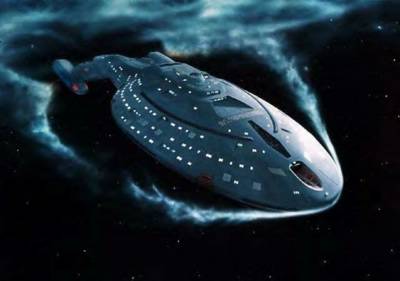Modern Aesop’s Fables: The Ethical Relevance of Star Trek PART 5 of 7
VOYAGER
How rigidly do you hold to your beliefs when no one is watching? Do you continue to hold yourself to high standards even when the yardstick that would measure you is not even remotely close? Do the rules of one galaxy even apply in another? These were the potentially debilitating questions facing Captain Janeway and the crew of the USS Voyager. Thrown millions of light years and a lifetime away from earth, Voyager was unique in that the starship and her crew were islands unto themselves, cut off from any sort of home support and contact, and forced to fight their way back to Earth through radically strange and unknown territory.
Captain Kathryn Janeway decides early on in her vessel’s banishment that the rules that governed them all before would continue, despite their distance from home space. They were ambassadors and would, as such, continue to hold themselves to the same standards as if nothing had changed. Starfleet regulations would continue to be upheld, uniforms would continue to be worn, and the things that made them Starfleet officers, rather then holding them back, would buttress their resolve in the coming struggles. Easier said then done. A hybrid of Kirk and Picard, Janeway is as impetuous as she is unflappable. Stubborn, but not to the point of being unwilling to admit her mistakes (and she surely made them), she is both aggressive and patient, strong and compassionate, resolute and flexible. Her life and leadership are an amalgam of both virtue and duty ethics. She constantly strains to learn and deepen herself. But perhaps her greatest challenges come not externally but internally. The idea of a commander’s decisions affecting an entire crew is seen with stark clarity on Voyager. Janeway realizes that when she chooses something for herself, it is for her entire ship. She has to be able to accept the consequences for her actions and comprehend that the crew must also bear the same burden. Her anguish over decisions is obvious throughout the series—not because she is indecisive but rather because she sometimes questions why choices she makes for herself must also be foisted on the crew. Ultimately, however, she does make the hard decisions. She could not otherwise be the captain. Furthermore, she must believe that her choices are superior to those of her crew, or else she would be emotionally hamstrung as a person and hacked off at the knees as a legitimate leader. This could not be better illustrated than in "Tuvix".
Summary: Following a freak transporter accident, the Vulcan, Tuvok, and the Talaxian, Neelix, are fused into a single person with all the memories and abilities of the two former individuals. The crew mourns the death of their comrades and friends while attempting to reconcile the addition of their new crewmember who decides to give himself the name, Tuvix. As several weeks pass, Tuvix settles into life aboard Voyager, and the crew adjusts to his presence. Then the Doctor announces that he has formulated a way to restore Tuvix to his two original components. However, a new problem now exists: Tuvix does not want to die, even if it means the other two can once again live. Tuvix argues that he has a right to live, and that by restoring Tuvok and Neelix, Captain Janeway will be presiding over nothing less than his execution. The Doctor agrees and refuses to take Tuvix's life against his will. In the end, Janeway performs the procedure herself over the objections of some of her senior staff as well as elements of her own conscience. Tuvok and Neelix are fully restored, but Janeway's relief is counterbalanced by the excruciating gravity of her decision to end Tuvix's life.
It is natural, after a catastrophic incident, to want to return things to the way they were. Which one of us would not want to amend a tragedy if we could somehow change the past? But what if, in doing so, you had to destroy others? Is the death of innocents justifiable in order to regain that which was lost? In this case, the innocent is a direct product of the tragedy. A living, breathing, wholly separate if not totally original individual stands before Janeway and pleads with her, “I don’t want to die.” In the end, she decides that the return of her officers and friends to their original selves supercedes the rights of an individual who would not have existed had they not lived in the first place. She forcibly ends one life in order to retrieve two lives. Contentious and divisive? You bet. The rightness or wrongness of Janeway’s ultimate decision is left in the hands of the viewers. This is one of the finest and most controversial of all Star Trek episodes. Perhaps more than any other series, Voyager was saturated with moral impasses that constantly put the crew, and, in turn, the audience, in turmoil as how to proceed. This Voyager episode, like the subsequent Enterprise episode below, shows us that sometimes our decisions are far from cut and dry and very often have drastically personal effects.



0 Comments:
Post a Comment
<< Home